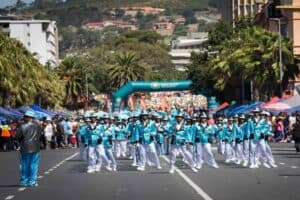Zimbabwean opposition politician Jacob Ngarivhume was also granted bail at his fourth attempt on Wednesday.

A court Wednesday granted bail to award-winning Zimbabwean journalist Hopewell Chin’ono who was arrested in July for tweeting in support of anti-government protests.
After three previous attempts at freedom, Chin’ono was ordered to pay bail of 10,000 Zimbabwe dollars ($120) by High Court Judge Tawanda Chitapi, who declared that a magistrate who had earlier denied him bail had been “misdirected” in his decision.
Zimbabwean opposition politician Jacob Ngarivhume was also granted bail at his fourth attempt since being detained on July 20 for calling protests against corruption and the country’s economic crisis.
High Court Judge Siyabona Musithu granted his appeal against the ruling of a lower court that had denied him bail and said “the magistrate erred.”
He was ordered to pay 50,000 Zimbabwe dollars ($602), surrender his passport and report to the police three times a week.
Ngarivhume, the leader of Transform Zimbabwe, has been charged with inciting public violence.
He was arrested alongside investigative journalist Hopewell Chin’ono, who remains in prison on similar charges.
Chin’ono, who had tweeted his support for the protests, is also expecting a verdict on a bail application on Wednesday.
The protests had been planned for July 31, the second anniversary of a general election won by President Emmerson Mnangagwa amid accusations of fraud.
The demonstrations were subsequently banned on the grounds of coronavirus restrictions.
Ngarivhume and Chin’ono are among a number of government critics and opposition activists arrested in recent months for voicing concern about the country’s mounting problems.
In neighbouring South Africa, President Cyril Ramaphosa said on Monday he would be sending a second batch of envoys to Zimbabwe within “days” in a fresh attempt to resolve the crisis.
A first delegation last month did not meet opposition parties and was widely criticised for failing to confront President Emmerson Mnangagwa about the crackdown on dissent.
Western diplomats in Harare last week warned Zimbabwe against using the coronavirus pandemic to crush dissent.
For more news your way, download The Citizen’s app for iOS and Android.






